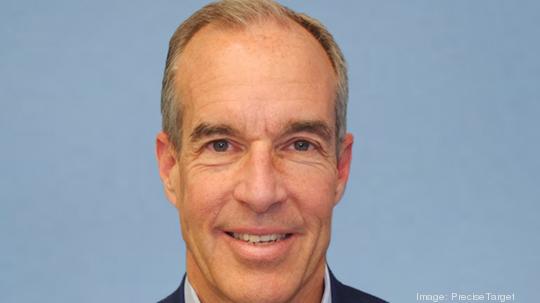
The Covid-19 pandemic has pushed consumers online — and Bethesda-based PreciseTarget is reaping the benefits.
That’s because the company provides transaction-level data on more than 5 billion individual purchases, giving highly detailed insights into the changing buying habits of more than 210 million Americans. In recent weeks, the company rolled out ConsumerInsights, a cloud-based data analytics tool kit for apparel and fashion brands to help find — and target — their best customers.
“These are the best of times for us. Everyone in retail is trying to pivot online and we’ve got the best data and so everyone is batting down our doors to get it,” PreciseTarget CEO Rob McGovern said in an interview. “All the major brands want our data.”
McGovern might be best known for founding job search giant CareerBuilder, which he launched in 1995 and where he served as CEO until he left the company in 2002. He founded PreciseTarget in 2014, which grew from a mix of self-funding and angel investments from high net worth investors, he said.
He declined to disclose the company’s earnings, but said PreciseTarget was growing and produces “a lot of revenue.”
The company’s low profile is in stark contrast to the well-known CareerBuilder.
“We want to be the most successful company that no one has ever heard of. We don’t care about the fame, we care about the success,” McGovern said.
In terms of that success, the pandemic has taken what was gradual growth in digital sales and supercharged it. Instead of about 12% of shopping being done online, it could hit 25% permanently, McGovern said. And many retailers face what he calls “the sparse data problem” in which they know little about a customer who, for example, may purchase one or two items a year from them, but meanwhile purchases 100 items annually from Amazon.
Those numbers are backed up by the Interactive Advertising Bureau, which found in November that e-commerce is now 23 to 25% of all retail commerce in the United States — seven times more than 1995 levels. Research by consulting firm McKinsey also shows an up to 40% increase in consumer intent to continue online shopping even after the Covid-19 pandemic is over.
PreciseTarget's goal? To allow retailers, clothing brands and advertising agencies to better target and sell to consumers. And that means helping retailers offer a better consumer experience, which makes customers more likely to buy because the retailer knows what they like, McGovern said.
“We don’t want all the retailers to go out of business. We think they have a technology challenge that we can help them with,” McGovern said.
But he also stressed that the company takes privacy concerns seriously. The data does not come with individual customers' identifying information, McGovern said. PreciseTarget works with local marketing information and identity company NeuStar to do what McGovern calls “pseudonym-ize” the data. PreciseTarget knows the purchasing history and profile of a specific person, but not that person’s name. Instead, online shoppers are given a unique ID to allow for targeting that does not expose their identity.
The company has grown to about 20 employees and what McGovern says is hundreds of customers. That includes licensing agreements with larger companies as well as one-time data purchasers. PreciseTarget also forms joint ventures and revenue shares with other data providers. Meanwhile, the company continues to work on the product, which McGovern hopes will eventually use artificial intelligence to provide even more insight.
“It’s going to be a big year,” McGovern said, adding there was a lot of pent-up shopping demand among American consumers. “People want to spend money. We think the year we are going to see a big acceleration which will drive our clients to want to buy more data.”
That has also led to a lot of acquisition interest, he added.
“It’s a rare day that someone doesn’t want to try and buy us. Because what we do is really unique,” McGovern said. But while the company will most likely sell once an offer becomes too good to turn down, McGovern does not believe that will be any time soon.
“We are having too much fun,” he said.


